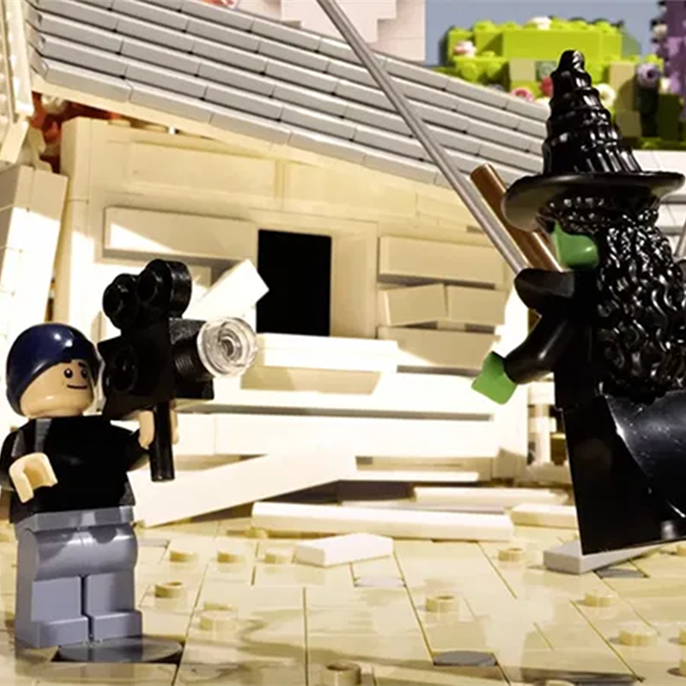On Thursday, the cast and creative team behind Amazon MGM Studios' upcoming film *Mercy* took center stage at New York Comic Con for a panel discussion. They delved into their distinctive approach to filming this highly anticipated title and unveiled the film’s gripping trailer. Chris Pratt, his co-star Kali Reis, director-producer Timur Bekmambetov, and producer Charles Roven were all in attendance at the event, held in New York’s iconic Jacob K. Javits Convention Center. The film is set to premiere on January 23, 2026.
Set against the backdrop of 2029, *Mercy* follows Pratt’s character, an LAPD detective who finds himself strapped to an execution chair. Accused of murdering his wife, he is given a mere 90 minutes to prove his innocence to an advanced AI system known as Judge Maddox (voiced by Rebecca Ferguson), who serves as his judge, jury, and executioner.

The panel commenced with a video message from Ferguson, who expressed her regret for not being able to attend in person. She teased the audience with promises of “mind-blowing footage,” a promise that was swiftly fulfilled when Pratt took the stage to present a nearly three-minute trailer.
“This was a departure for me,” Pratt remarked. “He’s a homicide detective living in the near future, a man who has witnessed and endured a great deal. He’s part of this groundbreaking new Mercy program they’ve developed, which essentially harnesses AI to overhaul their justice system for greater efficiency and to combat the surge in capital crimes in this version of Los Angeles. Their goal is simple: get these murderers off the streets and send a powerful message.”
Director Bekmambetov elaborated on the casting choices, highlighting the freshness and diversity they brought to the project. “There is something entirely new for Chris in this movie. It marks his next evolution as an actor. He portrays a dark, deeply vulnerable character in a highly dramatic narrative,” Bekmambetov said. “Chris is renowned for his action roles, but here he takes on a dramatic part, spending literally 90 minutes in the electric chair. Kali plays his partner, ostensibly there to assist him—or so we think. And Rebecca embodies the AI judge, a character both intelligent and, as we will discover, possessing a hidden heart.”
Reis, speaking about her role, shared insights into her character’s complexity. “She’s fiercely loyal, but she also harbors secrets that you—and I, upon reading the script—had to uncover,” Reis said. “The script provided such a solid foundation for me to delve deep and construct her backstory. There’s a reason why she places such unwavering faith in this court system.”
Discussing the film’s runtime and its impact on storytelling, Bekmambetov noted that the 90-minute constraint was “a fantastic tool because it forced us to be concise. We imposed a rule that the story had to unfold in real-time. It’s 90 minutes of relentless tension within this courtroom, with a ticking clock amplifying the stakes. It’s not just a practicality; we’re living in a world where AI is already at our doorstep. We don’t have the luxury of time to fully comprehend what lies ahead—how we’ll coexist with AI, whether it will be our ally, adversary, or even a child we must nurture and guide.”
For producer Roven, the AI element was a key factor in his decision to join the project. “When we first heard the pitch, AI was a topic of conversation, but it hadn’t truly materialized yet. By the time we received the script and began discussing the film, companies were already grappling with AI, and the future it promised was no longer distant,” he said. “I think the fact that our movie is set in 2029 makes it increasingly relevant. With each passing day, week, and month, real-world developments bring our film’s premise closer to reality.”
"The one topic you'll all be discussing as you leave here is this: Is this scenario really going to happen?" he later added during the panel discussion. "There are numerous factors to consider when deciding whether we should pursue this, given its profound implications for time and space—having an AI, which, let's be clear, isn't really a 'somebody' at all, but rather a sophisticated piece of equipment capable of instantly amalgamating vast amounts of evidence to determine whether someone is most probably innocent or guilty. Is that a good thing? Or is it bad?"
Much of the remainder of the panel delved into the film's unique visuals and the intricate filming process for a narrative that partially explores the intersection of screen life and physical existence. "Right now, we're living half of our lives in the physical world," remarked the film's director. "Half of my time is spent in a digital realm. That means half of the most significant events in my life are unfolding not in the physical world."
In the film, this concept manifests as "up to 1,000 screens displaying this character's digital life over the past decade being used as evidence against [him]," explained Pratt. "We had to film me seated in a chair, but we also had to capture all that digital content, which would later be integrated in post-production—me yelling at my wife on my daughter's Instagram, discovering her secret Instagram page, or various FaceTime calls stored in the cloud being used as evidence against me. All the things my friends and family have said, security footage," he elaborated.
Beyond what his character sees on those screens, Pratt's cop interacts not just with Ferguson's AI but also with his policing partner, an experience Pratt described as "a very high-production-value Zoom session with two people on two different sets," with Reis appearing as "essentially this projection hologram." The actress was filmed on a separate set, "and her image was projected for me to see, so I was acting opposite her."
"A lot of what you see is from her perspective of me. We did takes that sometimes lasted 50, 60, and even 70 minutes, so we essentially filmed the entire thing almost like a stage play all the way through to the third act," he added. "We just powered through it, which was an incredible challenge and something entirely different from anything I'd ever done before."
Later in the panel, the director and producers delved deeper into how they combined practical effects and green screen technology, along with the movie's IMAX experience, and how the director's fascination with people's screen lives influenced the film and its production.
"We really filmed downtown. There were five or six shooting days in the mornings because we were trying to capture those magic hours," Bekmambetov explained. "And then we employed unique technology to blend what we shot with footage from virtual production. Everything we filmed downtown was projected, and there was a track on stage where some action took place... Then we had a session in visual production, and, of course, visual effects lent us a hand."
"It was the first time we did as much footage on what we call a volume stage, which involved taking what we shot and displaying it on screens," said Roven. "We weren't just using vehicles in the second unit; we brought those vehicles onto the volume stage and put them on rollers. There's a scene in the movie where... [a] truck collides with a cop car, sending the cop car careening into a building where people are dining, and it takes out several of them. We filmed that for real on the volume stage, with the truck and the cop car crashing into the building. Normally, that area would be where the crew is watching the shot, so we had to be extremely careful because we almost took out the crew."
He continued, "The whole scene took about three minutes to shoot, and that's another thing you notice when making a movie on a volume stage. Even though you go out and film pieces of it elsewhere, on that stage, things happen very rapidly."
Bekmambetov also noted that they utilized robodogs to assist in filming at least one sequence. "We used robodogs, perhaps for the first time in the history of filmmaking," the director said. "The cameramen were robodogs because I used the footage of the robodogs moving through the extras in a crowd, filming the scene. How I directed the robodogs was straightforward. I just told them what I wanted. I said, 'Go over there and film those guys,' and it happened."
As for how audiences will experience this film, the panelists emphasized the importance of seeing Mercy in IMAX. "The experience will give you a real-life sense of what Chris is going through in the chair. Because those screens won't just approach you in a 2D manner. They'll almost seem to leap out of the motion picture screen into the audience," said Roven.

